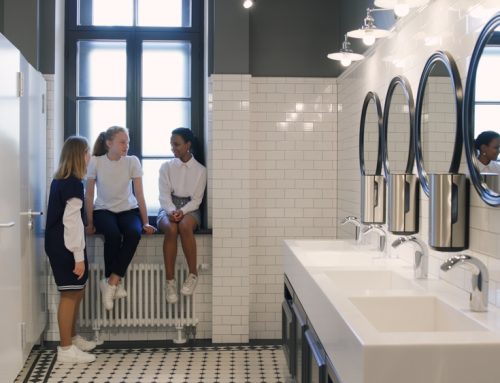Google ‘solid surface wash troughs’ and you won’t be short of results.
There’s no end of companies out there, all proclaiming to offer excellent washroom facilities. But if there’s one thing our years of experience have taught us, here at ONVO, it’s that not all handwashing solutions are created equal.
First time investing in wash troughs for schools? Eager to identify a great deal and steer away from poor design? Then read on to discover everything you need to know.
What is a solid surface wash trough?
Before we start, it’s important to establish exactly what we mean by a ‘solid surface’ wash trough.
Put simply, it’s a wash trough – a long, narrow sink designed for communal handwashing – made from a solid non-porous material. One of the most recognised and trusted brands of which is Corian.
Things to look out for
The good…
· Thermoforming
Thermoforming uses heat to mould a material into shape. Using this process to make the profile of a wash trough not only minimises the number of joints (and fewer joins mean fewer weak points) but it also produces perfectly rounded edges.
Eliminating sharp external corners helps to reduce the risk of serious injury if someone were to slip and fall against the wash trough. And avoids the cleaning issues posed by square internal corners.
· Flexible lengths
Wash troughs should be highly customisable and made to your specific length requirements, allowing you to optimise your layout and best utilise the space you have available.
· Variety of widths
In much the same ways as there should be flexibility in length, a quality solid wash trough manufacturer should also be able to offer a range of widths.
If you’re not being offered this level of choice, you need to consider what else you’re missing out on.
· Corian
You need a solid surface you can trust, so a recognised quality brand name is definitely something to look out for.
Corian is largely recognised and a leading brand name in solid surfaces and you’ll be hard pushed to find a more favourable option. As engineered stone, it’s less likely to crack and any damage that is incurred is easy to repair.
The bad…
· Avoid timber
A quality wash trough should avoid using timber, plywood or MDF in its construction.
The reason for this, is that over time the timber deteriorates and expands, which can cause hairline cracks in the Corian, particularly at the joints. Water then seeps through these cracks further compounding the problem.
The ideal combination of materials to look for is Corian and steel. Non-absorbent, steel is ideal for damp washroom environments. Highly resistant to corrosion, it won’t rot or deteriorate over time, nor will it swell and put undue pressure on the Corian surface.
-
Predrilled tap holes
Does the wash trough you’ve been looking at come with pre-drilled tap holes? This is a definite design flaw to steer clear of.
Why? Because it greatly reduces your options. A nursery trough sink used for small children rather than young adults of high school age, has the potential to accommodate more cleaning stations but predrilled holes will restrict this flexibility.
…and the ugly
· No choice
Every school is different, with different needs, and this should be reflected in the design choice of school wash troughs.
Aside from lengths and widths, any good system should also have the option to be cantilevered off the wall on brackets or to sit on a modular frame – meaning unattractive pipework can be hidden and kept out of harm’s way.
Not only does this keep the setting looking clean and smart, it also prevents dirt and bacteria from building up around awkward cleaning areas. And with multiple colour possibilities for the frame, it’s a great way to personalise and add style.
· No upstand
Wash troughs without built-in upstands mean the surrounding wall will quickly become marked and damaged from repeated splashing. Not only does this look unattractive but it also makes the area harder to keep clean.
· Poor shape
At first glance, a shallow sloping trough may look good but it’s not a practical option – particularly for children’s trough sinks.
A sloping design is far more susceptible to splashing than a traditional trough shape. They also typically have a thin 5mm waste slot for the water to exit. This is easier to block and inaccessible – so if something small manages to go down, it’s impossible to retrieve.
Talk to the experts
At ONVO, we’re so confident in the quality of our solid surface school wash troughs, we offer an impressive 10-year guarantee.
But don’t just take our word for it. Take a look at the work we’ve carried out for previous clients to see our systems in action.
To find out more view the range or get in touch with the team. We’re always on hand and would be happy to chat through your project requirements to identify the most suitable solution for your needs.





Leave A Comment